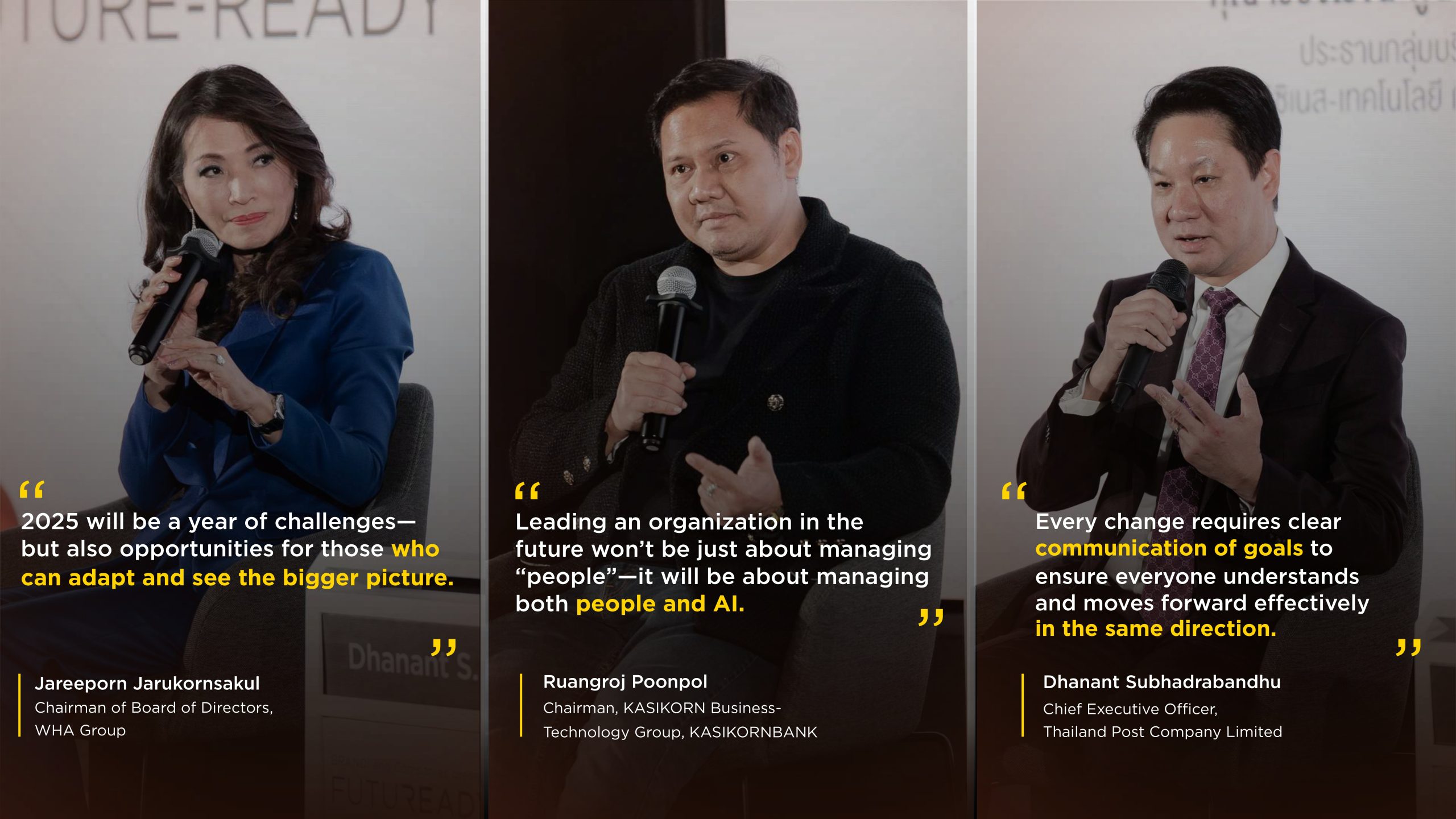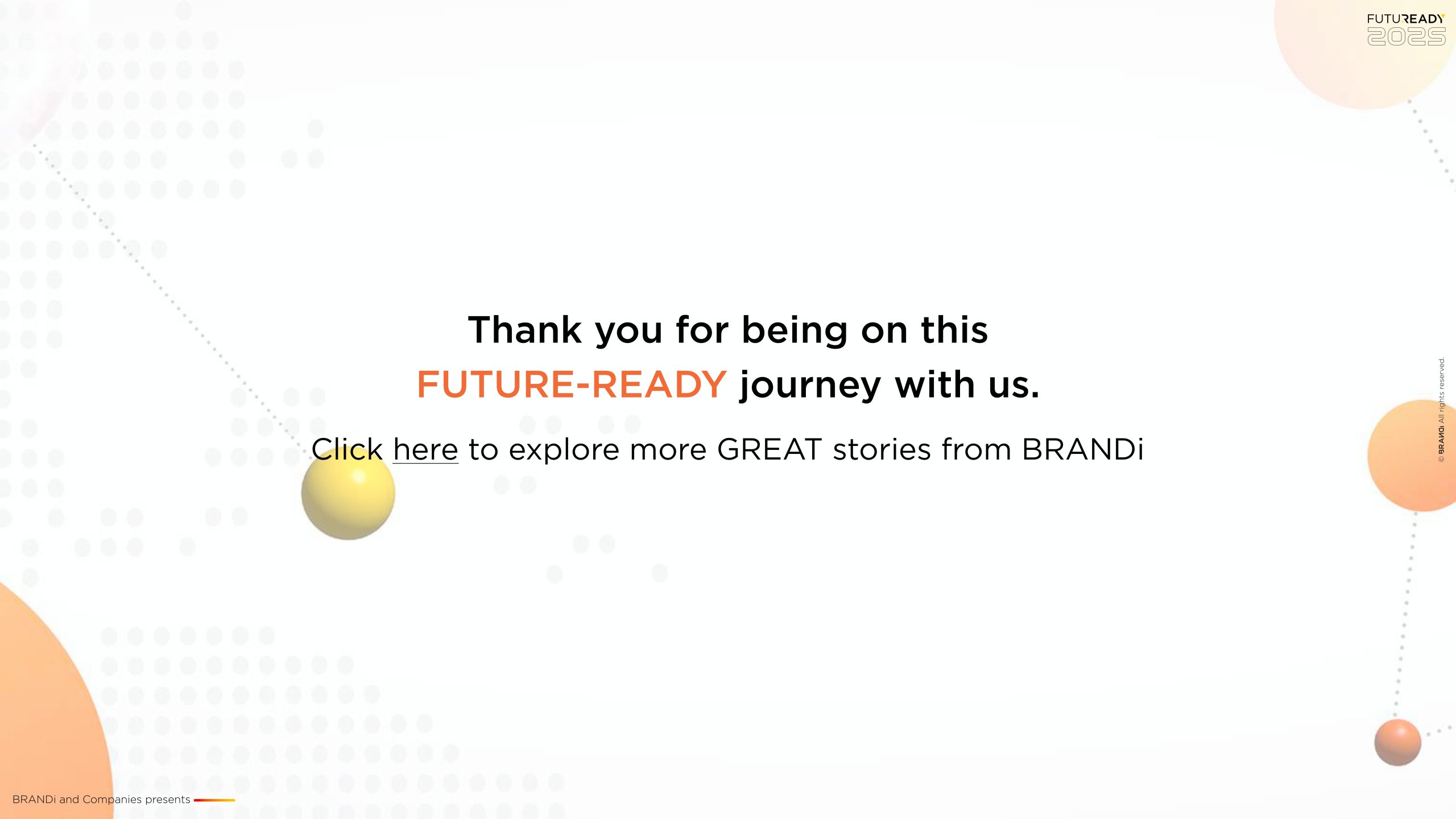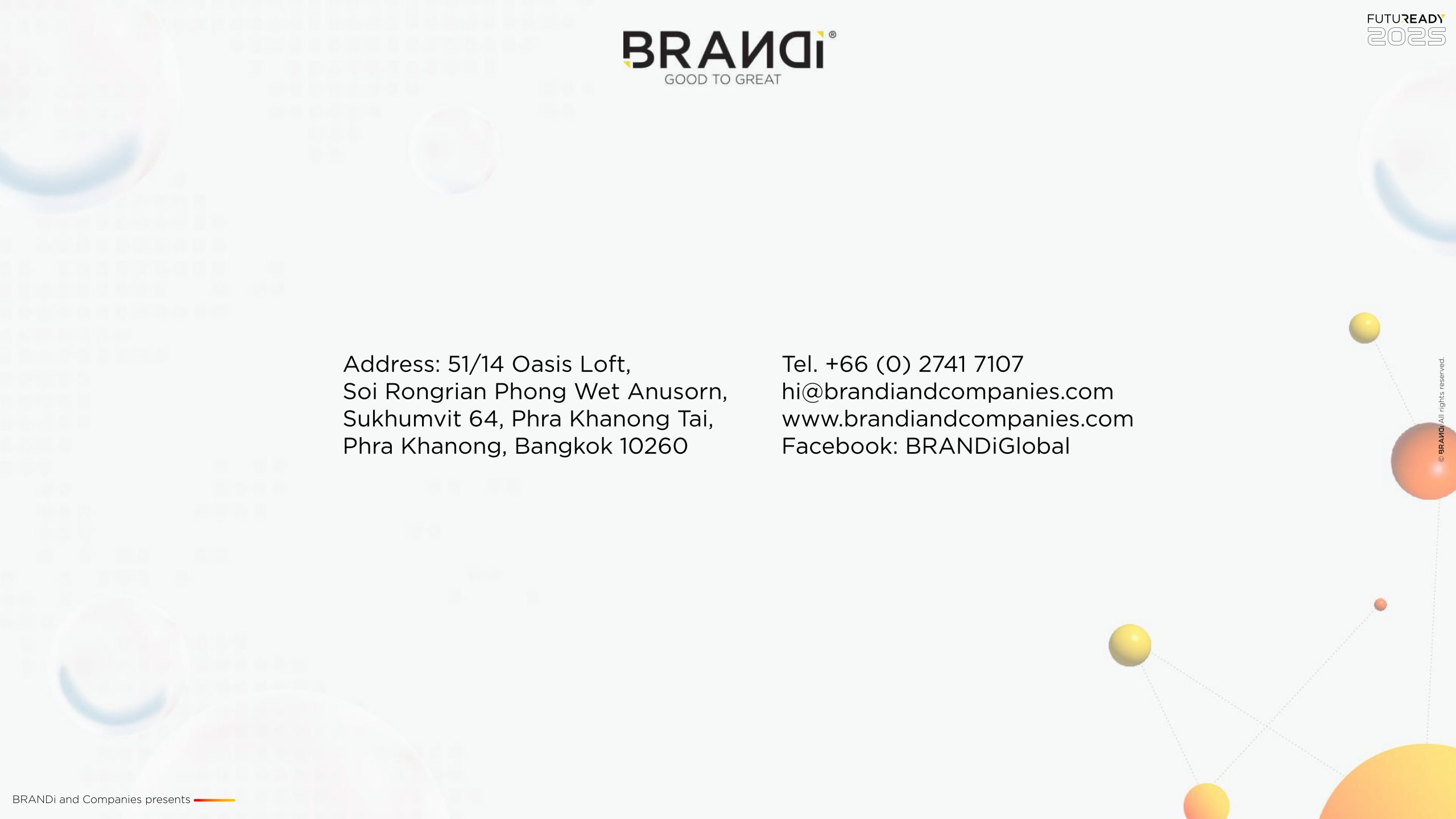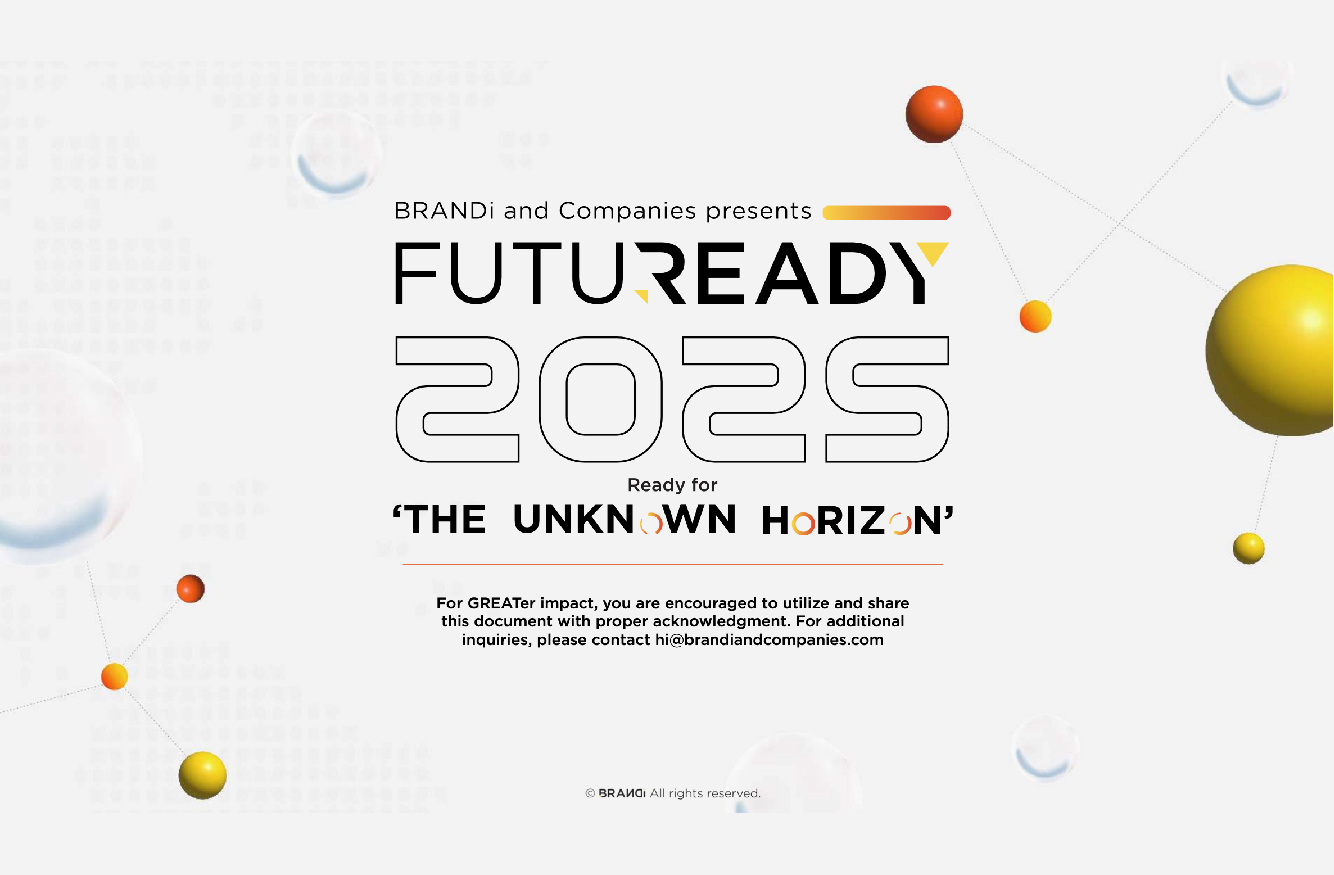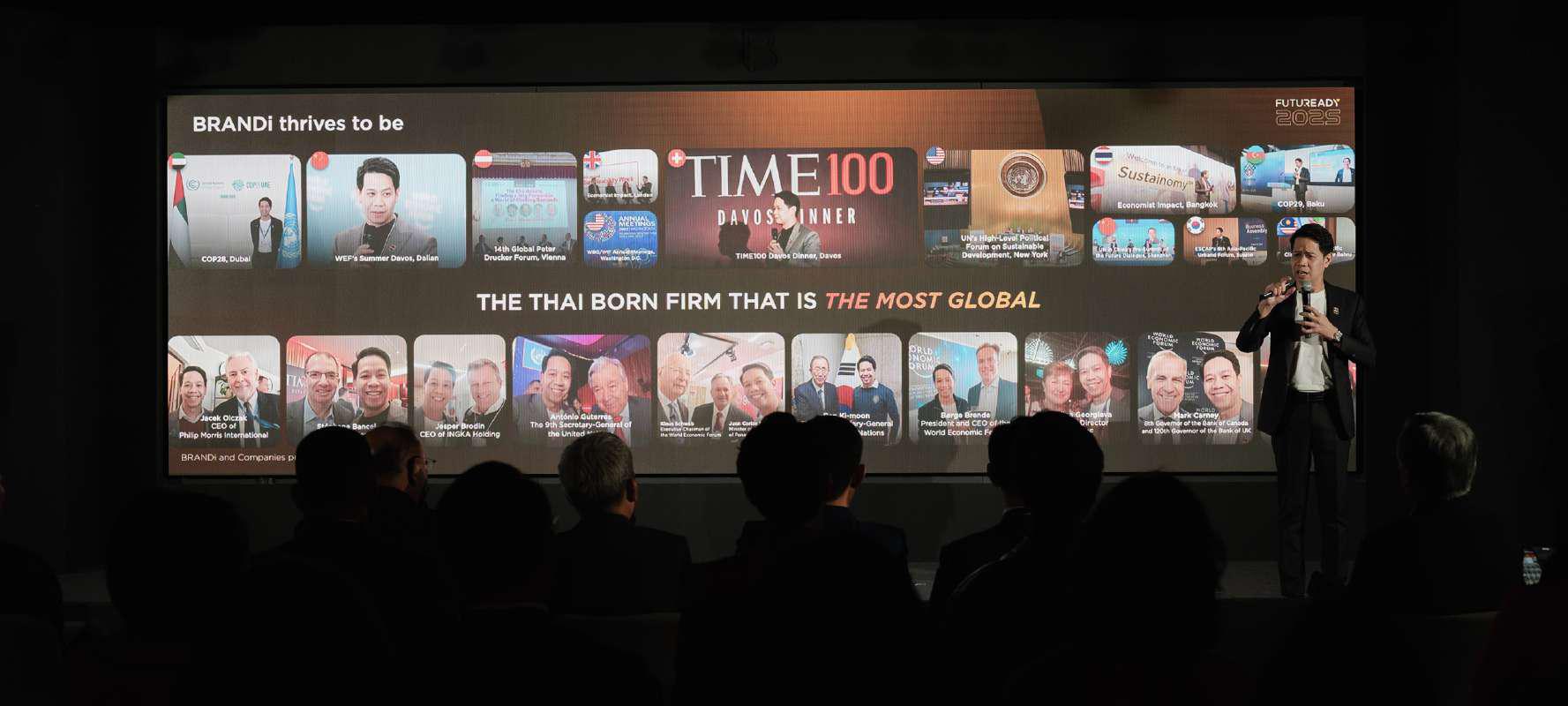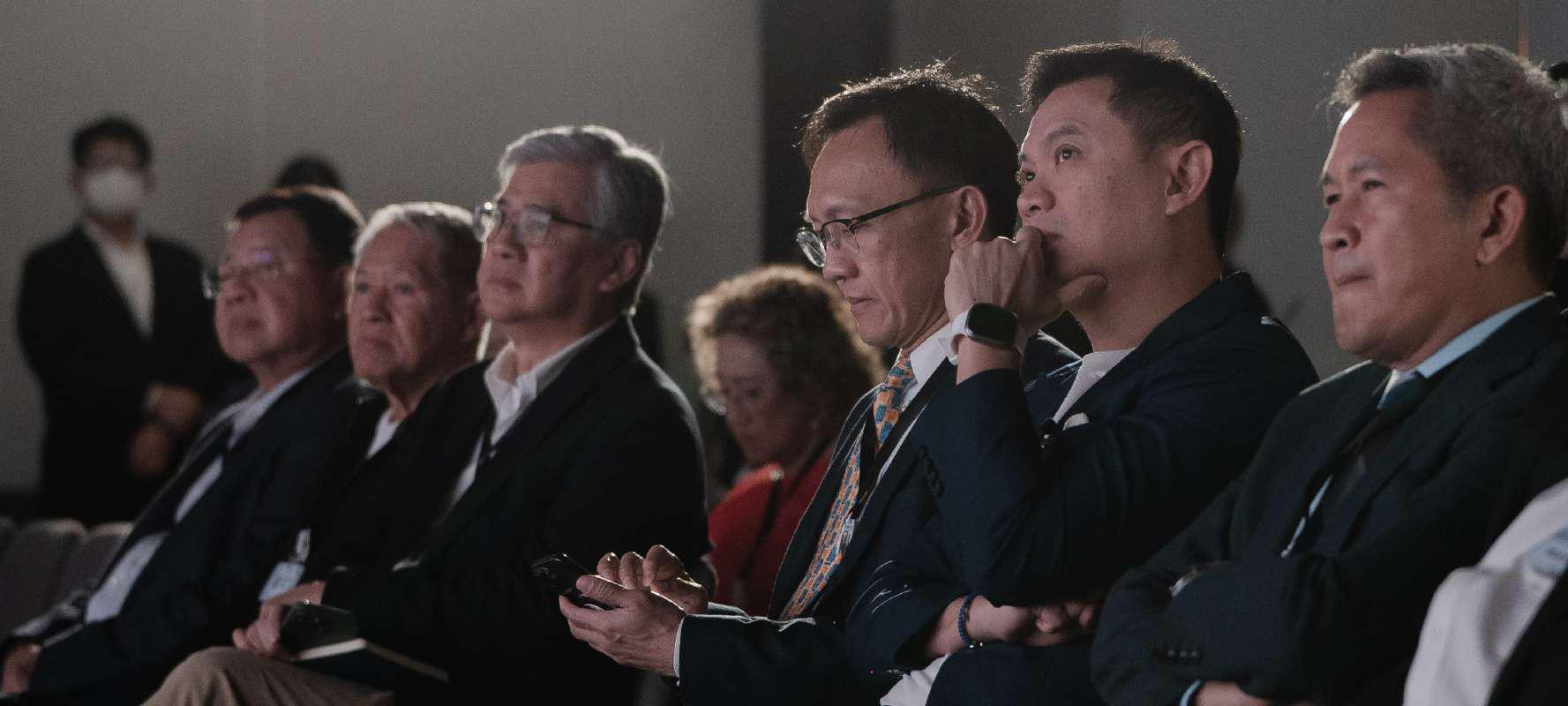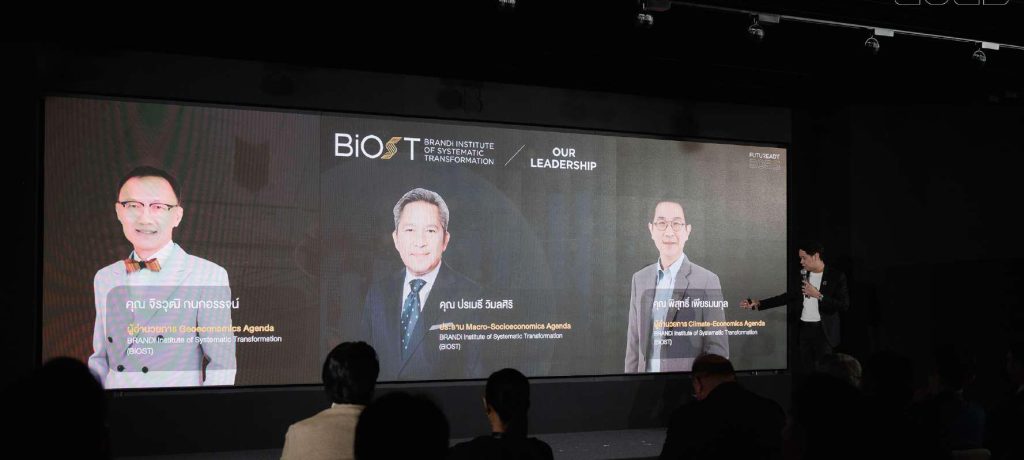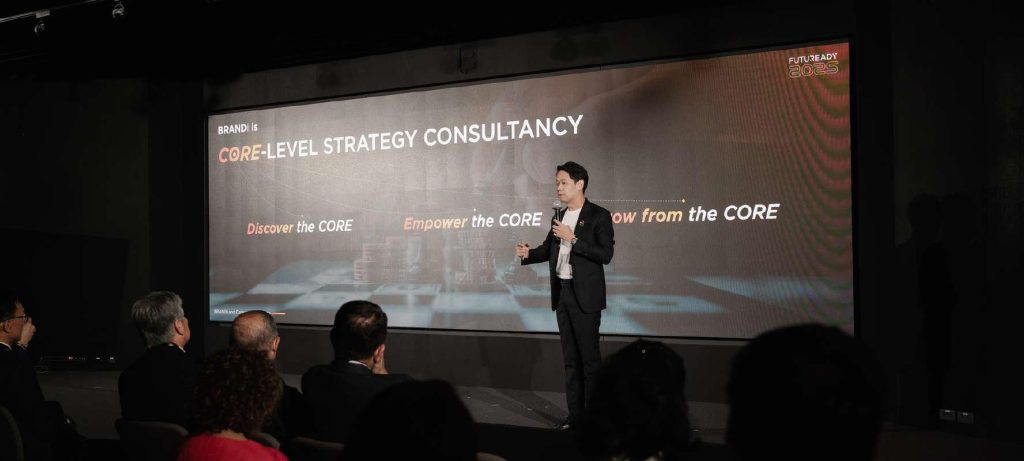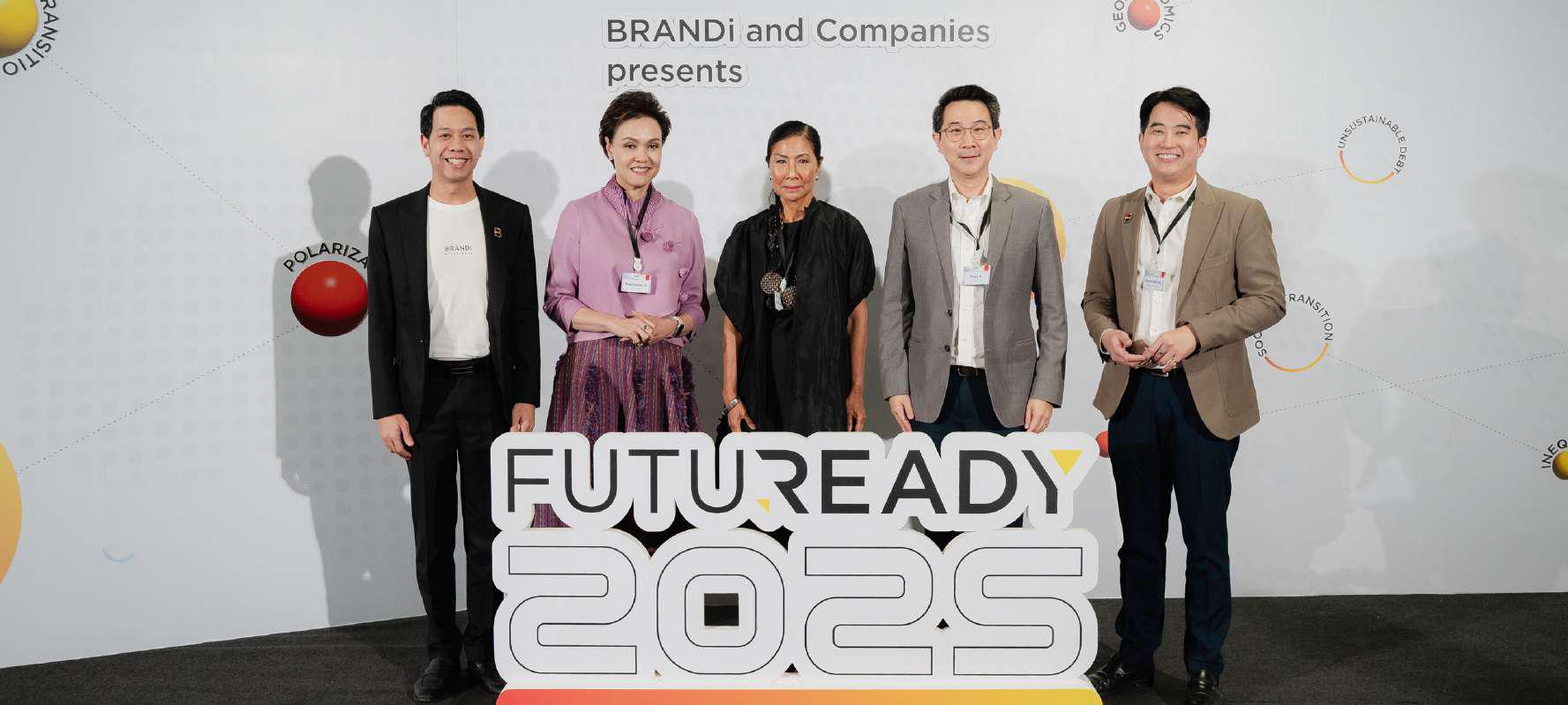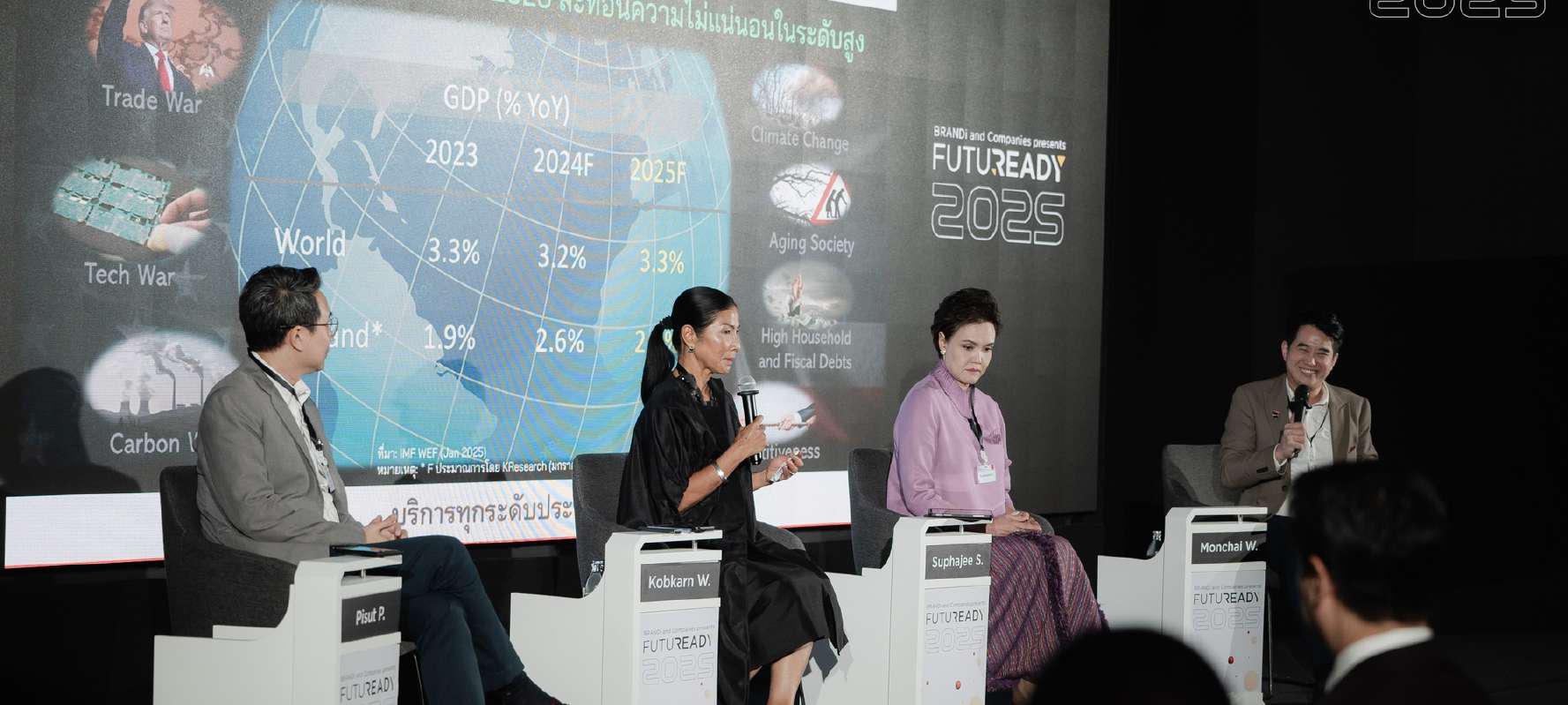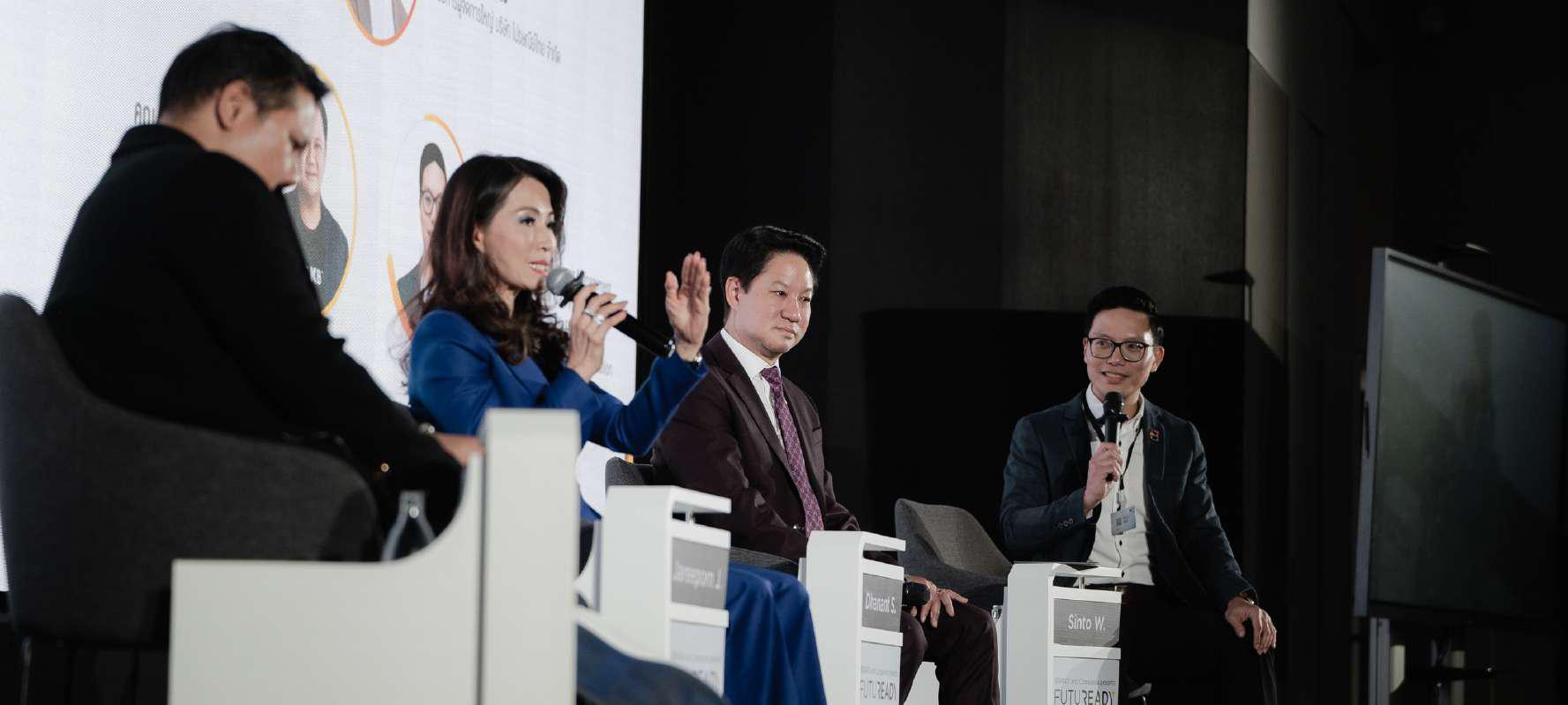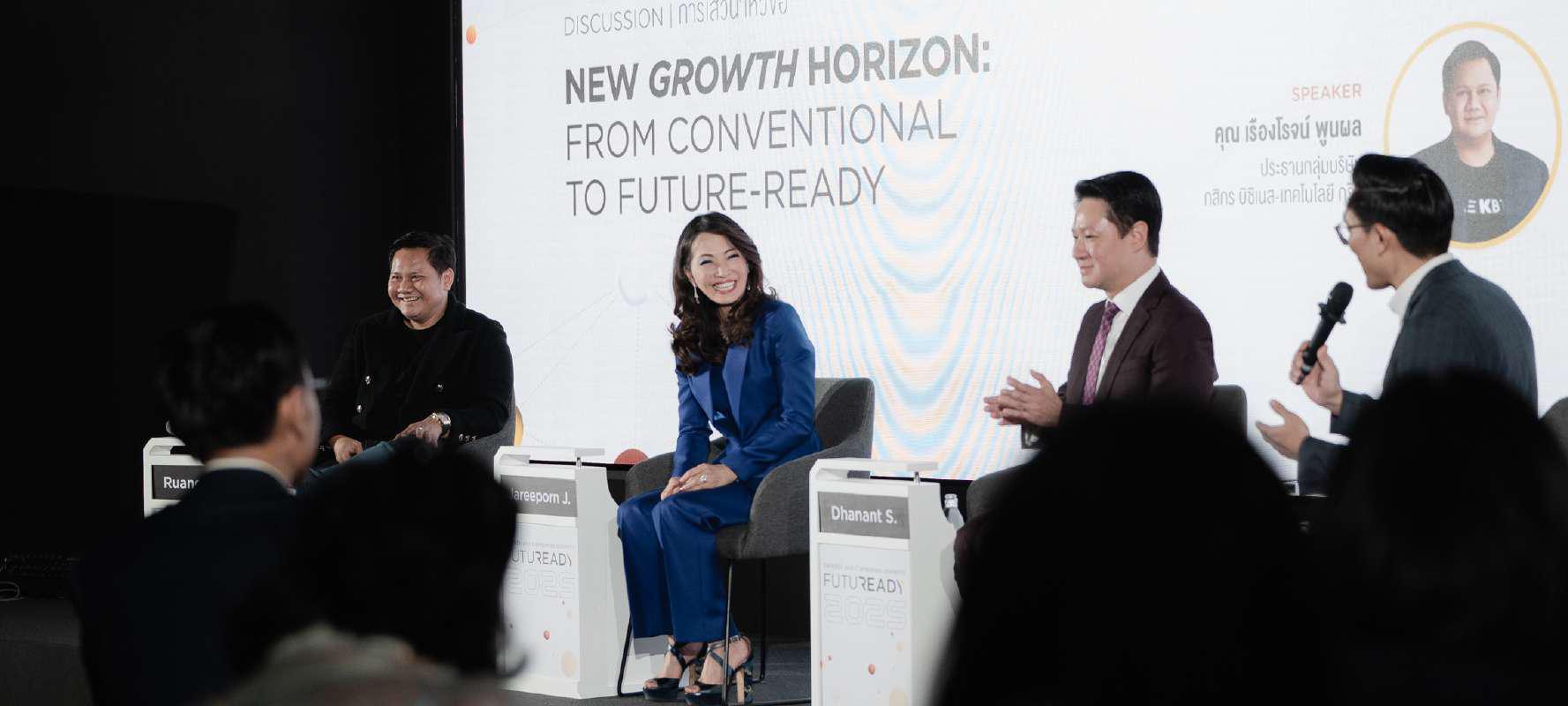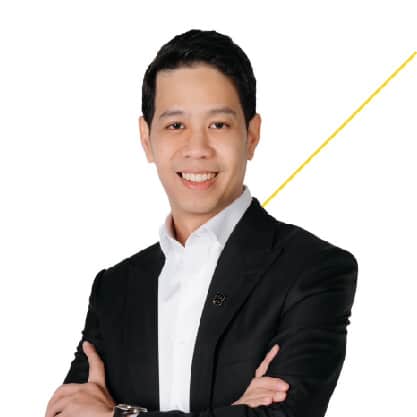“The only certainty is the uncertainty..We have no choice but to be Future-ready.”
About FUTURE-READY 2025
Ready for the Unknown Horizon
Navigating Uncertainty, Empowering Growth
Building on the success of its inaugural summit in 2024, held in collaboration with The
Economist Impact, BRANDi and Companies returned with FUTURE-READY 2025. Themed
“Ready for the Unknown Horizon,” this year’s summit took place on January 28th, 2025 at
BRANDi HopeQuarter in Bangkok. This high-level summit brought together leaders from the
public, private, and education sectors to address the challenges and opportunities of a rapidly
changing world.
The Need for FUTURE-READY
The event stemmed from the recognition that while global expectations are rising,
understanding of how to achieve growth in this complex landscape is diminishing.
Leaders are facing critical decision-making challenges in an era of unprecedented uncertainty.
FUTURE-READY 2025 aimed to provide a platform for knowledge sharing and insightful
discussions to equip leaders with the tools and perspectives needed to navigate
the unknown horizon.
Key Focus Areas
• Macroeconomics: Understanding the broader economic forces and global trends shaping the future, with a focus on Thailand’s readiness.
• Market Mechanism: Analyzing the evolving dynamics of markets and competition, particularly in the age of disruption, and identifying strategies for future-proofing Thailand’s
economy.
• Micro Engine: Empowering individual organizations and leaders to drive growth and adapt to the changing landscape, with a focus on innovation and future-ready strategies.
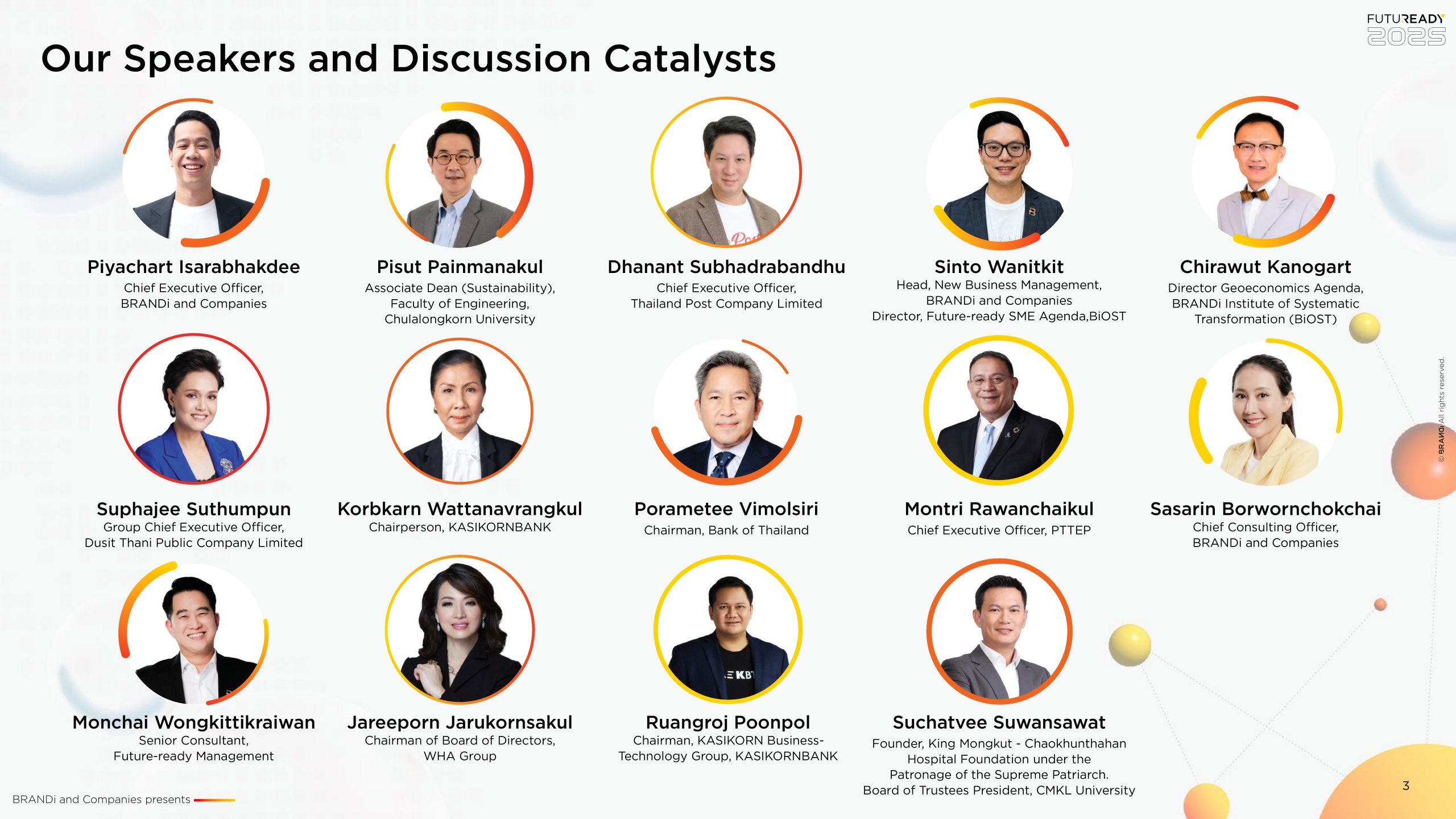
The Unknown Horizon: Global Scape, Glocal Solutions
BRANDi’s Approach
Mr. Piyachart (Arm) Isarabhakdee, CEO of BRANDi and Companies, commenced the “Unknown Horizon: Global Scope, Glocal Solutions” session at FUTUREREADY 2025 by underscoring the escalating challenges in achieving sustainable growth amidst a world marked by disruption, division, economic stagnation, and environmental decline. BRANDi and Companies, a Thai-born firm that is the
most global, operates as a “CORE-level strategy consultancy.” He outlined BRANDi’s approach to guiding organizations
Discover the CORE
Identifying and clarifying core competencies and unique strengths.
Empower the CORE
Equipping organizations to confront risks and challenges head-on, leveraging those strengths to overcome obstacles.
Grow from the CORE
Developing strategies to utilize existing strengths as a competitive advantage, fostering sustainable growth and expansion.
“Growth is hard-won, and sustainable growth even more so. Without Hope, such a journey becomes impossible.”
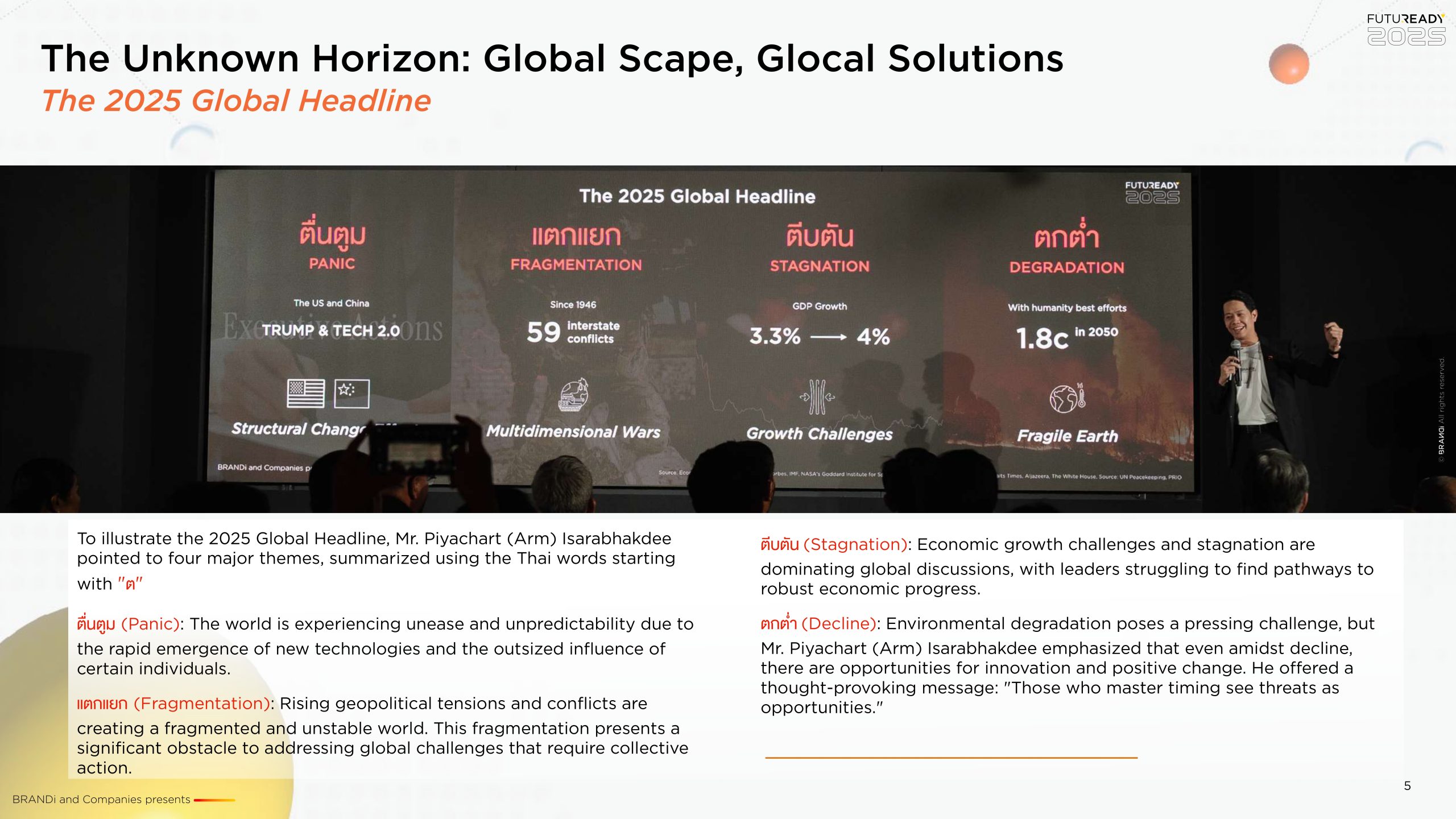
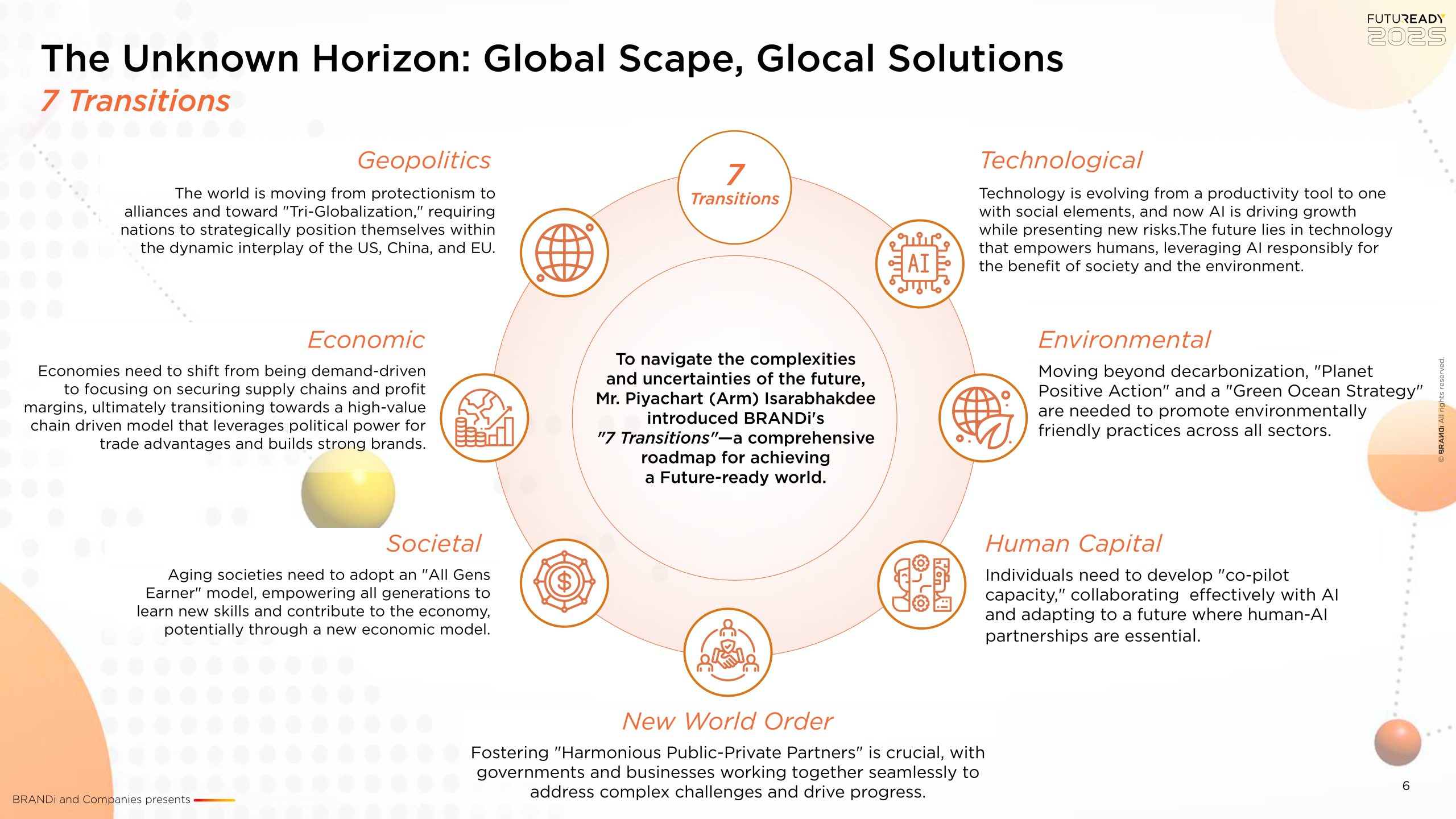
The Unknown Horizon: Global Scape, Glocal Solutions
A Call for a New Growth Narrative
The Missing Narrative
• Mr. Piyachart (Arm) Isarabhakdee points out a critical gap in the current global outlook: the lack of a compelling “New Growth Story.” The world is grappling with numerous challenges – disruptions, fragmentation, stagnation, and decline
– but there’s a lack of clarity on how to move forward and achieve sustainable growth. He poses a crucial question: “How can we envision a path to continued growth and progress?”
BiOST as the Change Catalyst
• This is where BRANDi Institute of Systematic Transformation (BiOST) steps in. BiOST is positioned as a “Change Catalyst,” accelerating the transitions needed to achieve a Future-ready world.
• BiOST recognizes that the world is not comprised of isolated “Single Silos.” Instead, it emphasizes the interconnectedness of various challenges and advocates for solutions that consider the interplay of different factors. This approach ensures that solutions are comprehensive and address the root causes of problems, rather than just treating symptoms.
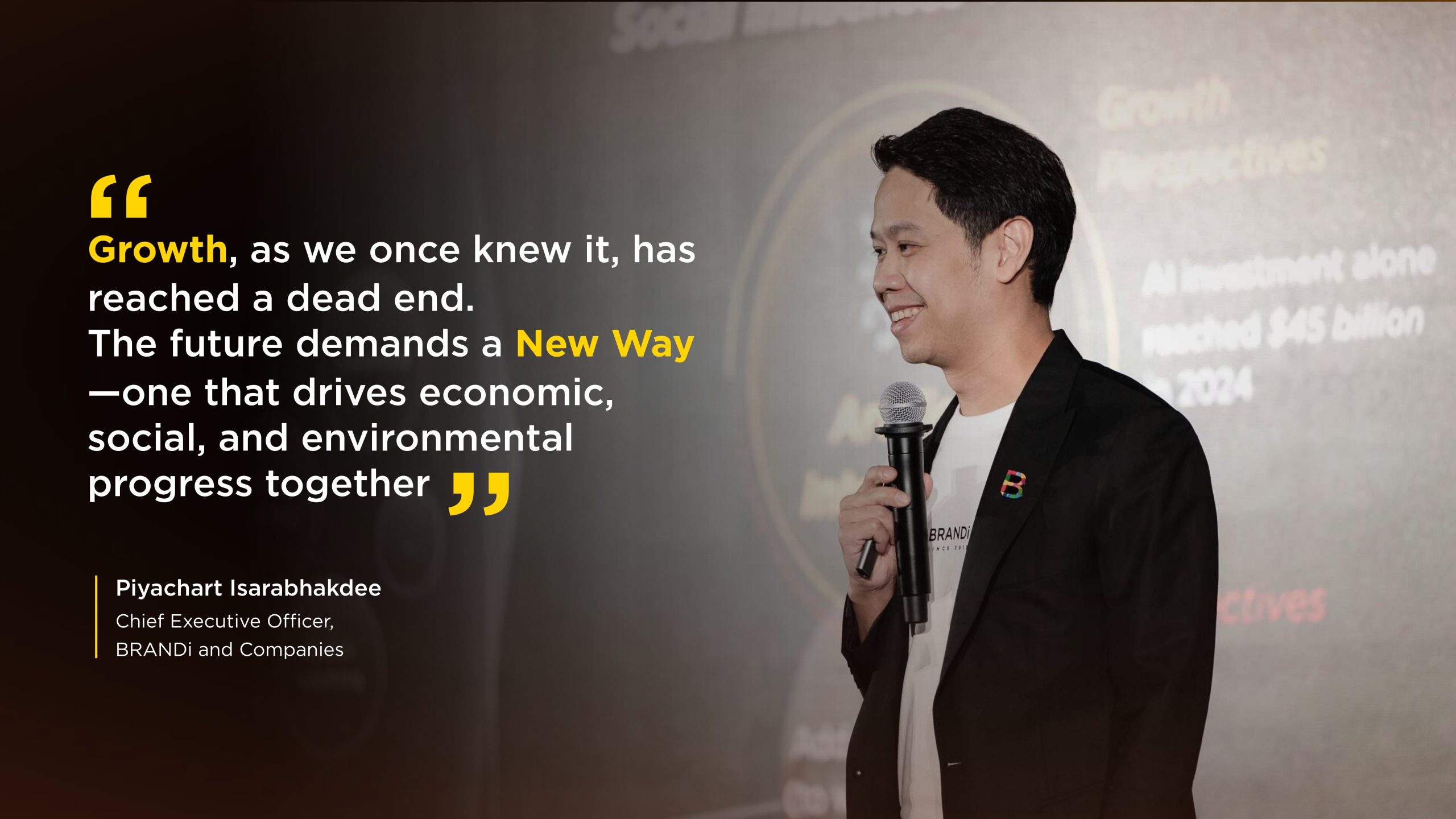
Macro-Framework: Future-ready Economy
Macro-level Briefing
From Technological Capital Driven to Human Capital Driven Economy
• Economic progress has moved through multiple waves, from mass production to AI-driven economies. While automation has historically
displaced workers, the next phase of development will need to focus on balancing AI autonomy with Human Capital, ensuring a workforce that is reskilled and integrated into new opportunities.
• The key to sustainable growth lies in investing in both technology and people, fostering an ecosystem where human intelligence and AI work together to drive inclusive economic progress.
It all starts from human, then system.
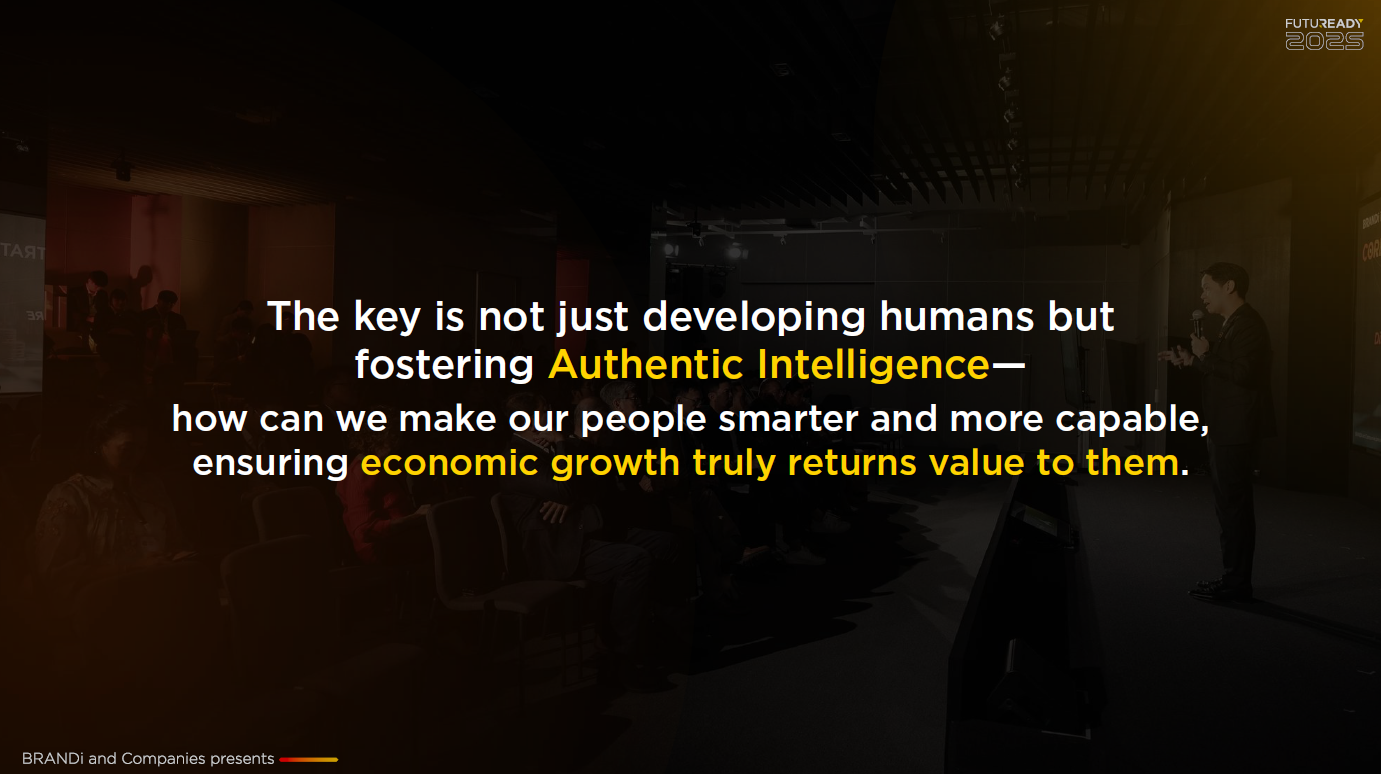
New Global Horizon: Thriving in an Unknown Horizon
Macro-level Discussion
Key Global Economic Challenges and Shifts in 2025
• The global economy faces complex challenges, with Trump 2.0 policies emerging as a key factor to watch in 2025.
• Potential trade disruptions from renewed protectionism could significantly impact Thailand.
• Energy security remains fundamental to economic stability and growth. In 2025, the U.S. will prioritize energy self-sufficiency, emphasizing domestic production, while Europe leads the energy transition, though it still requires a $3 trillion investment to ensure stability.
• The Energy Trilemma—balancing security, sustainability, and affordability—will continue shaping global energy policies. Meanwhile, Southeast Asia’s gas dependency remains a key concern, with Thailand as one of the region’s largest consumers, highlighting the urgency for energy diversification.
• In the AI race, winners will be nations like China, Japan, and those in the Middle East that embrace rapid adaptation, while those lagging behind risk deepening socioeconomic divides between the elite and the wider population.
Protectionism, energy security, and AI shifts challenge global stability, impacting Thailand. To stay competitive, Thailand must diversify energy sources, strengthen trade resilience, accelerate AI adoption, and invest in human capital development.
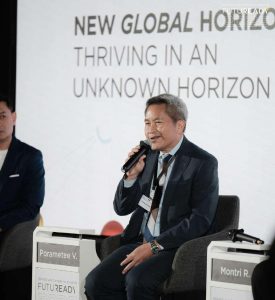
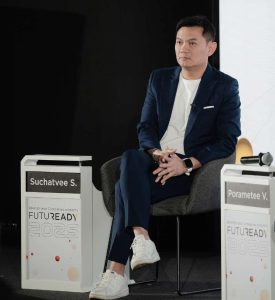
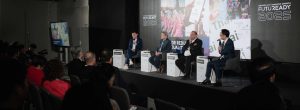
New Global Horizon: Thriving in an Unknown Horizon
Macro-level Discussion
People-First Approach to Technology Integration
• Thailand must take a people-first approach to technology integration,
focusing on Increased investment in education and digital literacy.
• Establishing national AI research hubs with global tech firms and expanding
digital infrastructure will drive economic competitiveness.
Balancing Short-Term Adaptability with
Long-Term Fiscal Discipline
• With Thailand’s public debt reaching 69% of GDP, maintaining fiscal discipline
while ensuring strategic investments is crucial. The government should
prioritize long-term trade-off analysis over short-term stimulus measures.
• Encouraging foreign direct investment (FDI) in technology and green industries
can enhance economic resilience, while targeted incentives for SMEs and
startups in high-value sectors will drive growth.
• To reduce dependency on China and the US, Thailand must diversify trade
partnerships by expanding relations with emerging markets and leveraging
ASEAN economic integration.
Energy Security and Workforce Readiness
• Energy security remains a priority as digital transformation increases demand.
• Workforce development, inclusivity, and flexible policies, including remote work,
help attract top talent. Adapting to global energy trends while ensuring
domestic stability is key to a resilient and sustainable energy future.
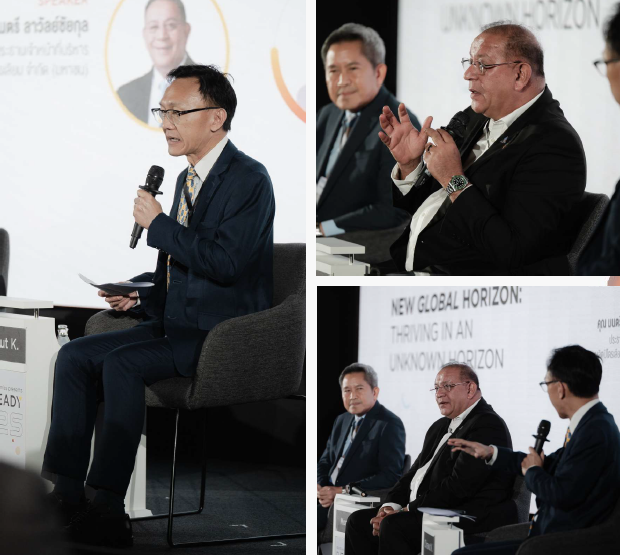
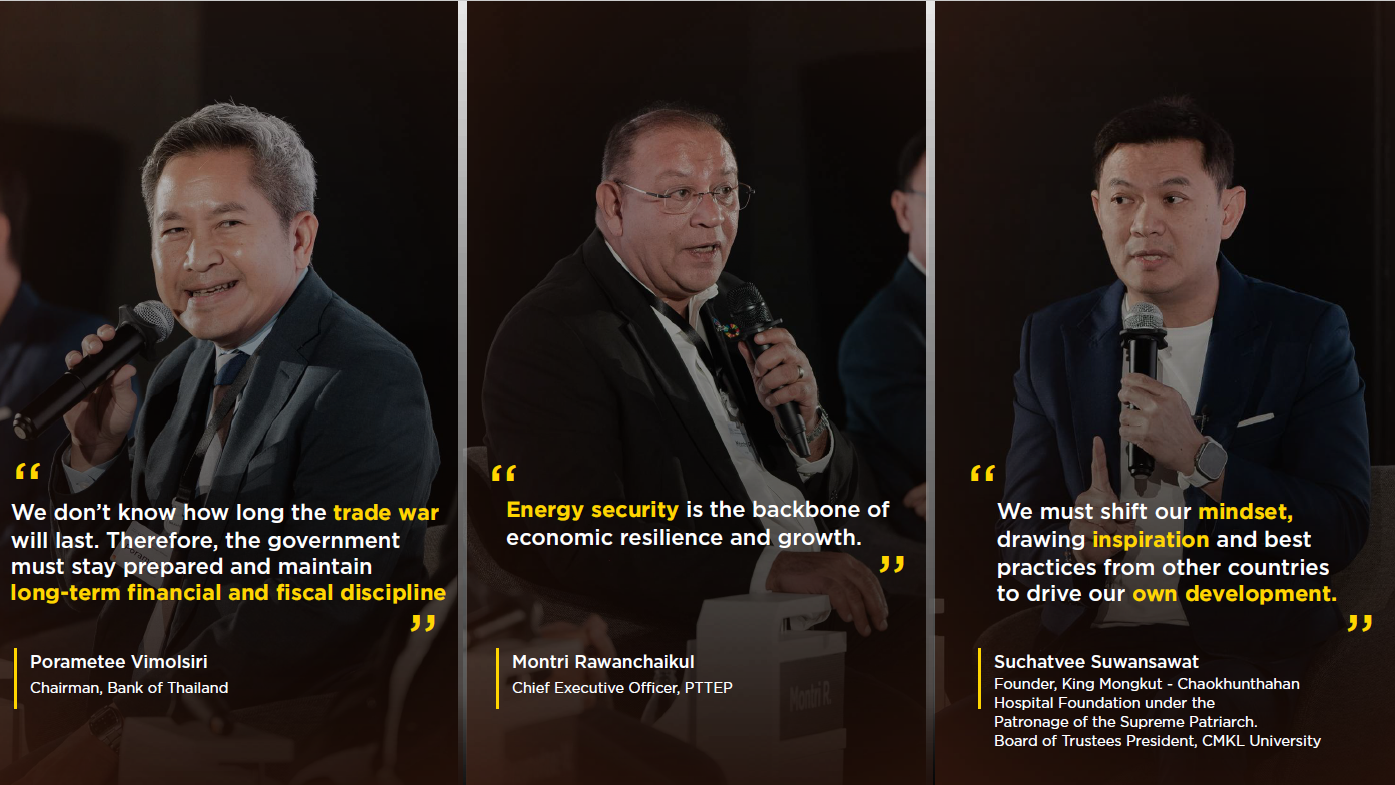
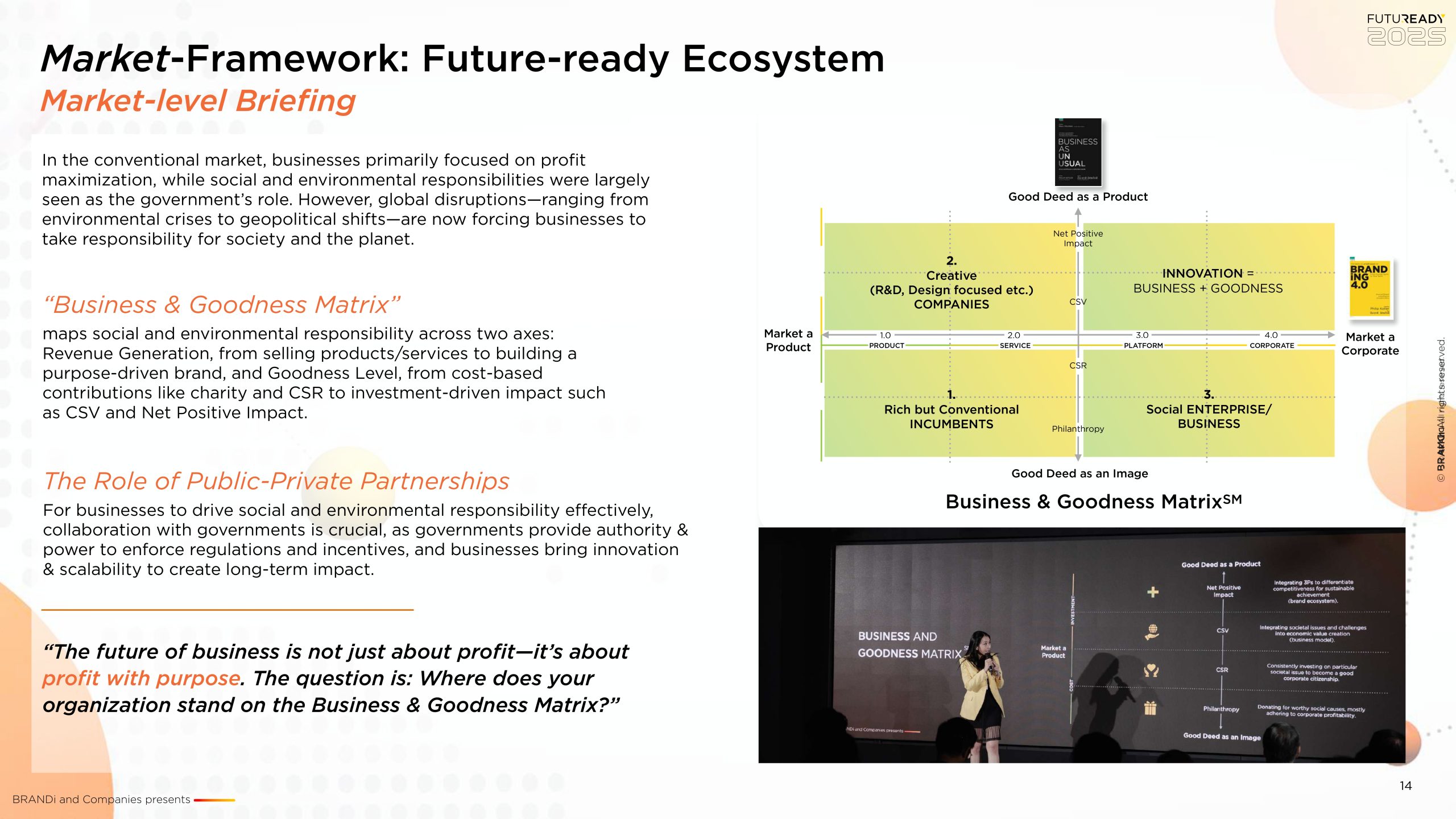
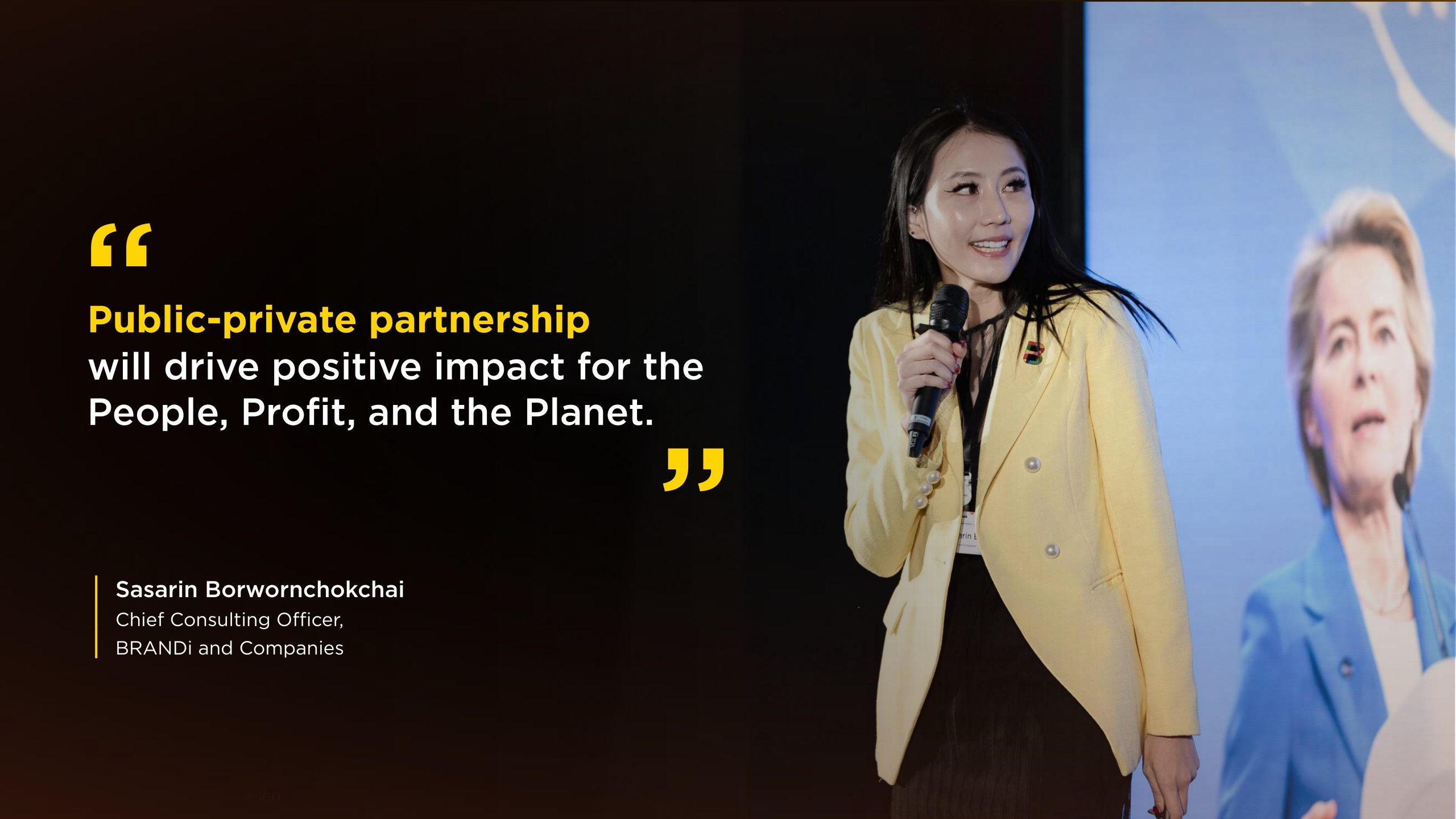
Market-Framework: Future-ready Ecosystem
Market-level Discussion
Navigating Financial Disruptions in
a Rapidly Changing World
• Global uncertainties—trade wars, technology conflicts, and the escalating carbon war—are evolving challenges reshaping economies and financial markets. Key trends such as shifting trade policies, carbon pricing, rising household debt, and regulatory shifts are redefining investor confidence and capital flows.
• Amidst this turbulence, Thailand’s financial sector is rapidly evolving, with Virtual Banks and tech-driven services disrupting traditional banking.
• The future belongs to AI-powered finance, DeFi, and embedded banking, requiring institutions to embrace digital transformation, foster innovationfriendly regulations, and strengthen capital markets with sustainable finance.
• KBank leads this shift by enhancing productivity through AI and fintech, investing in talent development, and optimizing digital infrastructure.
• At the heart of this transformation is people—driving solutions in finance, sustainability, and agriculture.
To stay competitive, banks must embrace inclusive growth, leverage individual strengths, and adapt beyond traditional models. Those clinging to legacy systems risk irrelevance in a digitized economy.
Market-Framework: Future-ready Ecosystem
Market-level Discussion
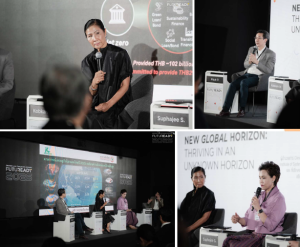 Positioning Thailand for a Sustainable and
Positioning Thailand for a Sustainable and
Competitive Future
• Thailand must strategically navigate the global New Competition, leveraging Foreign Direct Investment (FDI) to drive clean energy
adoption and long-term economic resilience.
• While some nations embrace Green Technology, others hesitate, creating competitive challenges. The U.S. withdrawal from the Paris Agreement proved that sustainability efforts can thrive through local policies and
market forces.
• For Thailand, an optimal electricity market must balance energy security with sustainability, attract foreign investment, embrace decentralized energy systems, and integrate market mechanisms like carbon pricing.
• The transition to clean energy also requires balancing grid stability, investing in energy storage, enhancing smart grids, and expanding regional cooperation to strengthen ASEAN’s energy market.
• Beyond energy, education plays a vital role in shaping future-ready talent. Universities must launch interdisciplinary sustainability programs, foster industry-academia collaboration, and promote lifelong learning.
By integrating global investment, energy innovation, and education reform, Thailand can secure its place as a leader in the sustainable economy.
Market-Framework: Future-ready Ecosystem
Market-level Discussion
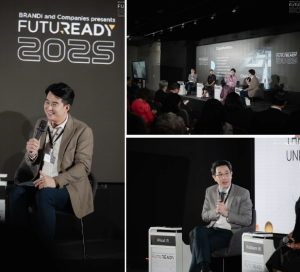 Redefining Thailand’s Tourism for a Sustainable Future
Redefining Thailand’s Tourism for a Sustainable Future
• Thailand’s tourism and hospitality industry faces mounting challenges from global megatrends, including climate crises, AI-driven misinformation, geopolitical conflicts, rising living costs, and cybersecurity risks.
• To remain competitive, the industry must embrace purpose-driven travel, catering to wellness, healthcare, and adventure tourism, while also promoting regenerative tourism, where travelers seek sustainable experiences that benefit local communities and the environment.
• However, structural issues—such as limited infrastructure in secondary cities, workforce gaps, and economic slowdowns—must be addressed.
• Dusit Thani Group exemplifies resilience through portfolio diversification across food, real estate, education, and hospitality, guided by strategic clarity, service excellence, and team empowerment.
• Thailand’s long-term success lies in unlocking untapped destinations, strengthening infrastructure, and expanding responsible tourism models that prioritize cultural preservation and economic distribution.
By transitioning from mass tourism to value-driven, experience-led travel, Thailand can secure its place as a global tourism leader.
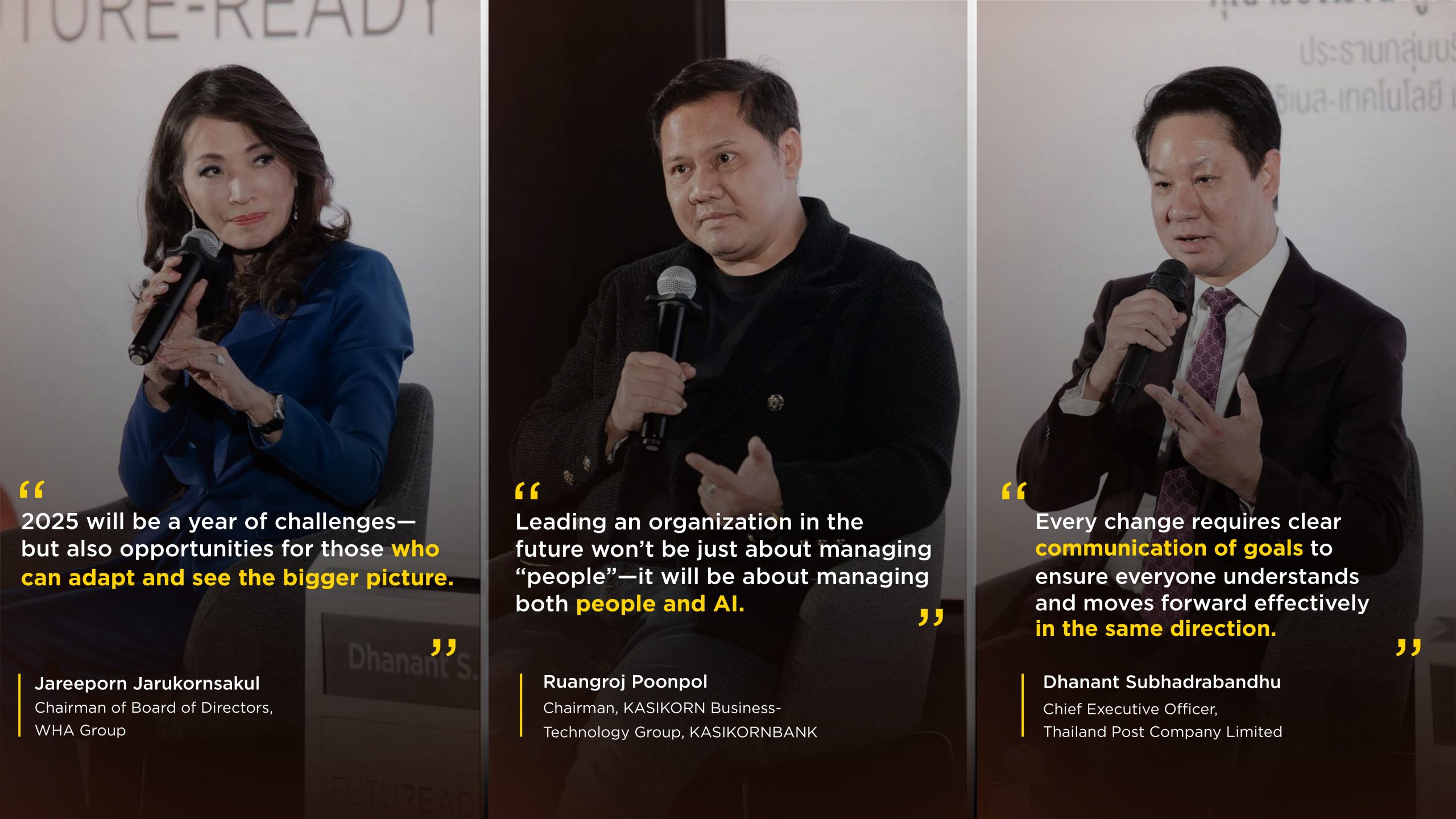
New Growth Horizon: From Conventional to Future-ready
Micro-level Discussion
The Future of Business
• Businesses must anticipate geopolitical shifts, trade policies, and technological advancements to stay competitive.
• Companies should integrate AI-driven solutions to enhance efficiency while maintaining a balance between automation and human expertise.
• Aligning with green policies and investing in eco-friendly innovations will attract investment and meet regulatory demands.
• Logistics and other industries must modernize infrastructure, enhance digital capabilities, and adopt consumer-centric strategies to remain relevant.
• Instead of competing directly with competitors in the market, businesses can consider monetize existing networks, build trust within communities, and expand service offerings.
Expanding partnerships beyond domestic markets will help businesses hedge against geopolitical risks and tap into new growth opportunities.
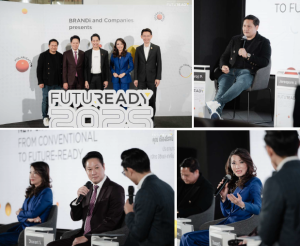 New Growth Horizon: From Conventional to Future-ready
New Growth Horizon: From Conventional to Future-ready
Micro-level Discussion
Elevating Thai Businesses in 2025 and beyond
• Success is now measured by sustainable transformation that benefits both businesses and communities.
• Businesses must actively adapt to change, view leadership as an enabler of talent, and design systems that foster innovation.
• Transforming state enterprises and large organizations requires overcoming resistance through clear communication, ensuring a unified vision, collective buy-in, and sustainable progress.
• Resilience and adaptability are no longer optional—they are the foundation for long-term success in an evolving world.
Future-ready businesses don’t just adapt—they lead with impact, and transformation to drive sustainable progress for both economy and society.
